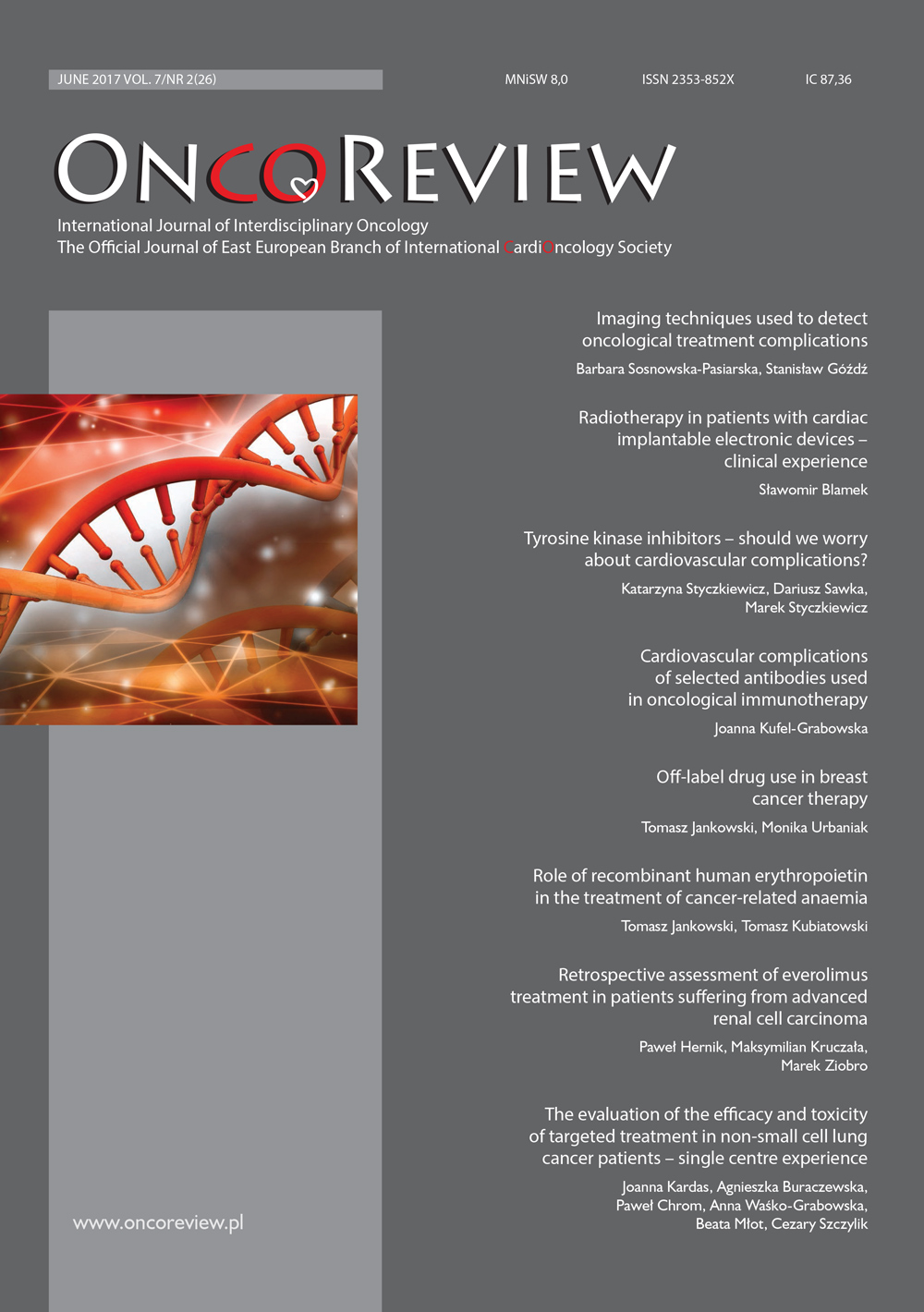Role of recombinant human erythropoietin in the treatment of cancer-related anaemia Case report
Main Article Content
Abstract
Anaemia is one of the most frequently diagnosed complications in cancer patients and also occurs during the course of cancer treatment. The condition can be observed in as many as 60–70% of patients who receive chemotherapy or radiotherapy. As a cancer symptom, it is found in 30% of cases and is particularly severe when accompanied by kidney failure. In patients undergoing cancer therapy, anaemia is treated with PRBC transfusions and/or recombinant human erythropoietin. The article discusses 3 case studies of patients with late-stage cancer (pleural mesothelioma, urothelial kidney carcinoma, and lung carcinoma), who suffered from moderate to severe anaemia during aggressive treatment with chemo- and radiotherapy. All 3 patients were treated with erythropoietin, which made it possible for them to stay on chemotherapy and/or undergo radiotherapy. Thanks to erythropoietin, they did not require PRBC transfusions and their general condition and quality of life improved. They tolerated the treatment well and no complications were observed.
Downloads
Metrics
Article Details

This work is licensed under a Creative Commons Attribution-NonCommercial 4.0 International License.
Copyright: © Medical Education sp. z o.o. This is an Open Access article distributed under the terms of the Attribution-NonCommercial 4.0 International (CC BY-NC 4.0). License (https://creativecommons.org/licenses/by-nc/4.0/), allowing third parties to copy and redistribute the material in any medium or format and to remix, transform, and build upon the material, provided the original work is properly cited and states its license.
Address reprint requests to: Medical Education, Marcin Kuźma (marcin.kuzma@mededu.pl)
References
2. Ludwig H, Van Belle S, Barrett-Lee P et al. The European Cancer Anaemia Survey (ECAS): a large, multinational, prospective survey defining the prevalence, incidence, and treatment of anaemia in cancer patients. Eur J Cancer 2004; 40(15): 2293-2306.
3. Wilson J, Yao GL, Raftery J et al. A systematic review and economic evaluation of epoetin alpha, epoetin beta and darbepoetin alpha in anaemia associated with cancer, especially that attributable to cancer treatment. Health Technol. Assess. 2007; 11(13): 1-202, iii-iv.
4. Radziwon P. Dlaczego warto rozważyć stosowanie leków stymulujących erytropoezę w niedokrwistości u chorych na nowotwory? Medycyna Faktów 2016; 4(33): 359-366.
5. Cancer and chemotherapy-induced anemia. Online: http://www.nccn.org.
6. Rizzo DJ, Brouwers M, Hurley P et al. American Society of Clinical Oncology/American Society of Hematology Clinical Practice Guideline Update on the Use of Epoetin and Darbepoetin in Adult Patients With Cancer. J Clin Oncol 2010; 28(33): 4996-5010.
7. Schrijvers D, De Samblanx H, Roila F; on behalf of the ESMO Guidelines Working Group. Erythropoiesis stimulating agents in the treatment of anaemia in cancer patients: ESMO Clinical Practice Guidelines for use. Ann Oncol 2010; 21(suppl 5): v244-v247.
8. Foubert J. New EORTC guidelines for the treatment of anaemia in patients with cancer: Implications for nursing practice. Eur J Oncol Nurs 2006; 10: 177-186.
9. Bohlius J, Schmidlin K, Brillant C et al. Recombinant human erythropoiesis-stimulating agents and mortality in patients with cancer: a meta-analysis of randomised trials. Lancet 2009; 373(9674): 1532-1542.
10. Tonelli M, Hemmelgarn B, Reiman T et al. Benefits and harms of erythropoiesis-stimulating agents for anemia related to cancer: a meta-analysis. CMAJ 2009; 180(11): E62-71.

